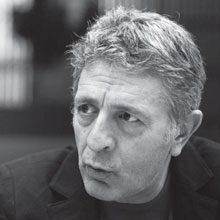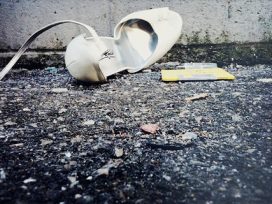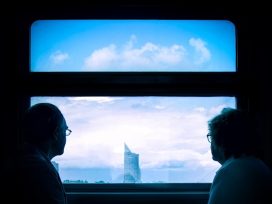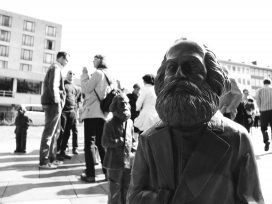Victor Tsilonis: What moments do you consider to have been the most important in your career as a journalist?
Stelios Kouloglou: It’s been a long journey which includes numerous turning points. A hugely important one was when I decided to go to Paris to study on a post-graduate journalism course. This broadened my horizons completely, provided me with a whole different perspective of the world and of Greece within it, and certainly of journalism. I had thirty fellow students from thirty different countries. That was an extraordinary multicultural experience and very good training in international reportage. Another was my decision in 1989 to stop making political reportage in Greece and go to Moscow as a correspondent, giving up on a promising career as a director or a “big” political editor. Everyone told me I was ruining my career. On the contrary, it proved to be especially helpful in all respects. I experienced all the major changes in the Soviet Union and every other communist country I periodically visited, did a lot of reportage, met and became friends with journalists of international calibre and wrote novels and books.
VT: You have received many awards, one of them in 2000 from the European Union and the University of Hagen, for the documentary Communism: The Great Utopia of the Twentieth Century. When the film was released there were criticisms about the truthfulness of the documentary’s evidence – did this criticism bother you?
 SK: There are always those who disagree. It is impossible to have unanimity, besides that would be dull. But there are two kinds of criticism: bona fide criticism based on different beliefs and criticism born of frustration. I use arguments when dealing with critics of the first category. As far as critics of the second category are concerned, I use humour, because in these cases there is always a cartoon in my mind entitle “Noah’s Ark”. Noah is together with all the animals during the Great Cataclysm, but a woodpecker outside the Ark tries to make holes in it. The caption at the bottom of the cartoon is “There’s at least one jerk in every story.”
SK: There are always those who disagree. It is impossible to have unanimity, besides that would be dull. But there are two kinds of criticism: bona fide criticism based on different beliefs and criticism born of frustration. I use arguments when dealing with critics of the first category. As far as critics of the second category are concerned, I use humour, because in these cases there is always a cartoon in my mind entitle “Noah’s Ark”. Noah is together with all the animals during the Great Cataclysm, but a woodpecker outside the Ark tries to make holes in it. The caption at the bottom of the cartoon is “There’s at least one jerk in every story.”
VT: Your TV show “Reportage Without Frontiers” was abruptly discontinued in 2008, a few days before the screening of a revealing documentary about the government. This led to a wave of public protest, including an Internet petition and a demonstration in front of the offices of the Greek Television Channel. Is censorship the first step on the way to threatening journalists physically?
SK: Yes, but I think these are two different issues. Censorship is an ancient art which, as the case of Socrates illustrates, was often punished by death. Instead of trying to understand the message, they shot the messenger. This reaction continues, albeit in different ways.
VT: How was the idea of your current project, the online news portal Television Without Frontiers, conceived?
SK: I developed the concept before being expelled from the Greek TV Channel, but didn’t have the time to realize it. The idea was essentially founded on my belief that the Internet is the future of journalism. Now that I had time at my disposal, I started it.
VT: How do you cover the operating expenses of “Television Without Frontiers” – rumours say that the costs are almost 20,000 euros a month?
SK: They were even higher at one point! I took out a loan, which I hoped would suffice for the whole project, according to business promises and advertising contracts that I had made. “Television Without Frontiers” began operating in the summer of 2008 and, to my dismay, the economic crisis burst slightly after – so I was caught somewhere in between. Perhaps I should have stopped, but I had found offices, bought the equipment, recruited the staff, and so I had to go on. However I never anticipated the speed and severity of the Greek crisis. We have reduced expenses, without making any redundancies: staff members who left after the trial period were not replaced. I also had to cut back on our plans for Web TV, although it was a pioneering service at that time. The balance is still in the negative again, but fortunately not to a destructive extent.
VT: And it’s still free, even though there were some thoughts about creating restricted access to the site via subscriptions.
SK: This is still a “plan B”. I believe that sooner or later we will have to resort to such a model, because people must understand that in order to have essential and reliable information you need people who work on it systematically. This can’t happen on an amateur or voluntary basis, like so-called citizen journalism, which is of limited efficiency anyway.
VT: So you believe that independent journalism can exist and be an objective source of information? Isn’t that just a myth?
SK: Not at all – the success of “Television Without Frontiers” is proof of that. There’s a long way to go, but alone the fact that it is independent and publishes things without being controlled by any economic or political authority is what makes it popular. If I had the means for more reportages and more people, I think it could become an ideal independent medium of information.
VT: We see very often that new media are satisfied merely to reproduce the news of major information channels. In the end, how reliable can this channel of information be? Are citizens deluding themselves that they have access to alternative and better information by visiting these websites?
SK: As far as “Television Without Frontiers” is concerned, we do our own reportages on a series of issues. If a website just takes stuff from other sources, it doesn’t provide anything special. However, it is often the case that the news is the “same” in all media, but that its presentation makes all the difference. We try to present “parts” of news, whether they involve domestic politics or international issues, in a different way. For example, we have conducted a series of interviews that examine the debt issue, among others with Oskar Lafontaine and Pedro Paez, the Minister of Finance in Ecuador, who negotiated its debt. In other words, we attempt to promote broader information awareness and alternative perceptions of current affairs.
VT: Can you give an example of news highlighted by “Television Without Frontiers” that was of the utmost importance but not in the media limelight at the time?
SK: One example was the destruction of the Hellenic Railways Organization (OSE), which the government attempted in the name of the Memorandum. We refuted all the propaganda about the OSE owing billions. In fact, the OSE wasn’t in debt to third parties, rather it was the Greek State that owed the Railways money. We stressed that rail connections were being closed down that were cost-effective or could become cost-effective and highlighted the protests taking place in various parts of the country against the moves, stressing the issue of prosecuting the responsible ministers. This was a typical example of widely covered news presented in an alternative way: of an issue which “was and wasn’t” in the limelight.
VT: And what has the reportage revealed? Who are the ones that benefit from the closure of railway lines?
SK: The contractors of public works, and especially of public roads, benefit greatly. We have a ministry that operates like a car dealer. Another example was the immigrants’ issue, where our perspective on this incident was completely different from the official one, which took a negative view of the immigrants’ demands. We made the distinction between demands made at the beginning, which had a maximalist and, to my mind, a wrong perspective. The point is that we are dealing with a social and humanitarian issue, since there are many people here in Greece who have worked for many years and should not be considered as illegals. The way we presented it, the importance we gave the issue, was completely different from other media.
VT: You made the film of Confessions of an Economic Hitman long before the outbreak of the financial crisis, when most people in Greece were still in the dark. Did you have a prophetic feeling?
SK: Yes, but I’d like to have been even more prophetic, to shout even louder warnings. In a sense, this is the job of a journalist, to inform people of the changes happening in the background or incubating developments that haven’t occurred yet, but will have a significant impact on people’s lives when they do. Greek journalism has completely failed completely on this score, as the case of Greek debt demonstrates.
VT: Is it still failing, even now?
SK: Now’s the easy part. After the IMF got involved, everyone started protesting. The important thing is to make people understand how the country has taken a path that inevitably led to IMF intervention. In 2005, I made a documentary that actually referred to this issue, i.e. that debt is slavery and that the role of banks was wrong. But I was just a single person, while there existed entire journalistic organizations that failed to foresee the situation or point out that our economy was in an utter mess and that, at some point, foreign banks and states would stop lending us money.
VT: How do you see the future of Greece? Can we learn any lessons from Perkin’s account of his work as an “economic hit man”?
SK: The lesson is that debt is slavery and that, when a country is indebted and caught between the IMF and the World Bank, it loses its independence and ability to set its budget. The “economic recipe” that we obliged to follow today leads to further decline and surrender of national wealth. In the case of Greece, it’s the 50 billion euros worth of property that we are supposed to sell, “the family silver”. But while the economic hit man blackmailed presidents into taking huge loans, in order to have them at their beck and call, Greek governments did so without having to be persuaded. They needed neither economic hit men nor anything else. All it took was an obsolete political system that handed out a few mirrors to the natives for their acquiescence. As I have said many times in the past, the established system, which includes the media, is rotten; it was inevitable that sooner or later is would become very sick. It was a system lacking any balance whatsoever, in which the prime minister could do “whatever he felt like”. This was only ostensibly changed in the 1980s, with the constitutional amendment by Andreas Papandreou. After that, we still had a system beyond control, built on nepotism, with family dynasties taking turns in power. These are all symptoms of third world-type politics. When a country produces less than it spends and has a corrupt political system that is unable to steer the country, a happy ending is impossible.
VT: What do you think: Will the family silver suffice? Will chemotherapy work?
SK: Under no circumstance. Even if 50 billion euros of property truly could be sold – it is an arbitrarily estimated figure – in 2015 we would owe almost the same amount of money we owe today.
VT: Nonetheless, immigrants are unaware of this fact and so they come to Greece or use Greece to enter Europe. I presume this was one reason why you entitled your last documentary “Welcome to Europe”, in which you play with the idea of “news as fabrication”.
SK: Yes, immigrants don’t want to stay in Greece, they weren’t born with this dream, as we would like to believe. Immigrants perceive Greece as a passage to somewhere else. In any case, the conditions they have to deal with in their own countries are even worse compared to here. This is also an indication of the problem’s magnitude – it can’t be solved by putting up fences on the Greek-Turkish borders. As far as the documentary is concerned, yes, I do try to include cinematic narrative elements.
VT: If one doesn’t watch the last minute-and-a-half, one might believe that it’s all happening in other countries and not in Greece.
SK: Yes, the film plays with the idea that all that glitters is not gold. In a manner of speaking, this is exactly why immigrants also fall for it. They think that they are in Europe, but find themselves in a country that treats them the way a third world country would. With the help of loans, Greek people lived in a virtual reality. This bubble of consumption was delicious, just like the bubblegum you give to children who aren’t yet mature citizens. The media played a major role in creating and preserving this bubble. Now it has burst in our faces: even the people who created it are now paying, while their job was to burst it in the first place.
VT: In Intellectum we ran an article about the virtual rebel – the person who uses Facebook and Twitter but participates in no real revolution, despite what he thinks when he uploads songs of epic World War II battles or the banner with the word “Freedom” flown from the School of Engineering of the University of Athens in ’73. Is this virtual reality refuted by popular movements in the Middle East, Tunisia, Egypt, Libya, Bahrain and Syria?
SK: While social networking portals are mostly used for making new acquaintances or catching up with friends, their role in these countries was truly subversive. I have spoken with a blogger who was imprisoned for four years in Egypt for internet postings. He spent two of those years in complete isolation, without seeing either his lawyers or his parents. So we are talking about appalling conditions. Social media played a massive role in the revolution’s evolution: I have talked to Asmaa Mahfouz, for example, an activist who posted a video on the eve of the protest, writing that “you should all take part otherwise you are not men”. This had a catalytic role: the revolution in Egypt didn’t fall from the sky. Youth organizations formed in the last couple of years that promoted the whole issue. Their operation was primarily based on the Internet. This happened without “external support”, which was not the in the case with overthrow of Milosevic and the Orange Revolution in Ukraine, which were bankrolled by the Americans. On the contrary, the Arab revolutions had no such support whatsoever.
VT: What do you think about the Greek social movements, which certainly aren’t revolutionary to the same extent – for example the “I Don’t Pay” movement?
SK: “I Don’t Pay” expresses, to my mind, a justified rage towards neo-colonial practices, since the contracts signed by the toll constructing companies are of a colonial nature. It also expresses a fair indignation about the stupidity of the Ministry of Transport and Communications, which comes against a real problem: it has a loss of income due to fare evasion, which should have been eliminated by the Ministry itself, however it’s solution is to raise fare prices, which increases evasion even more. These people are incapable of thinking about this simple thing. Hence, there is a justified indignation. However, I believe there needs to awareness of how where this movement leads, because in the end hooligans might want to attend a free game in the stadium, or I might quarrel with my grocer and refuse to pay for his goods. In other words, I don’t believe that an entire movement could be based upon this idea. Nevertheless, the fact that the authorities subsequently announced the reduction of fares was a very significant success.
VT: How do you see the media landscape in Greece? Some traditional newspapers have already been closed, TV stations have gone bankrupt, radio stations vanish in a blink of an eye…
SK: We are heading towards a radical restructuring which will bring reduce the Greek media landscape to more realistic dimensions. The fact that we have eight TV networks of national range is a result of anarchy and not based on the economic reality or market demand. If countries of analogous economic potential, Portugal for example, have two public and two private stations and much fewer than 180 provincial stations, this means something. In Greece, we have the biggest number of newspapers per resident in the whole world, the biggest number of titles and a very low rate of circulation. It’s absurd. These newspapers have been supported up until now by the lottery and betting company OPAP. This will come to an end at some point, hence we are moving towards a complete restructuring. Unfortunately, even good efforts in the media field are affected by the crisis.
VT: So, the baby is thrown out with the bath water?
SK: Definitely, yes, the danger surely exists.

 SK: There are always those who disagree. It is impossible to have unanimity, besides that would be dull. But there are two kinds of criticism: bona fide criticism based on different beliefs and criticism born of frustration. I use arguments when dealing with critics of the first category. As far as critics of the second category are concerned, I use humour, because in these cases there is always a cartoon in my mind entitle “Noah’s Ark”. Noah is together with all the animals during the Great Cataclysm, but a woodpecker outside the Ark tries to make holes in it. The caption at the bottom of the cartoon is “There’s at least one jerk in every story.”
SK: There are always those who disagree. It is impossible to have unanimity, besides that would be dull. But there are two kinds of criticism: bona fide criticism based on different beliefs and criticism born of frustration. I use arguments when dealing with critics of the first category. As far as critics of the second category are concerned, I use humour, because in these cases there is always a cartoon in my mind entitle “Noah’s Ark”. Noah is together with all the animals during the Great Cataclysm, but a woodpecker outside the Ark tries to make holes in it. The caption at the bottom of the cartoon is “There’s at least one jerk in every story.”




